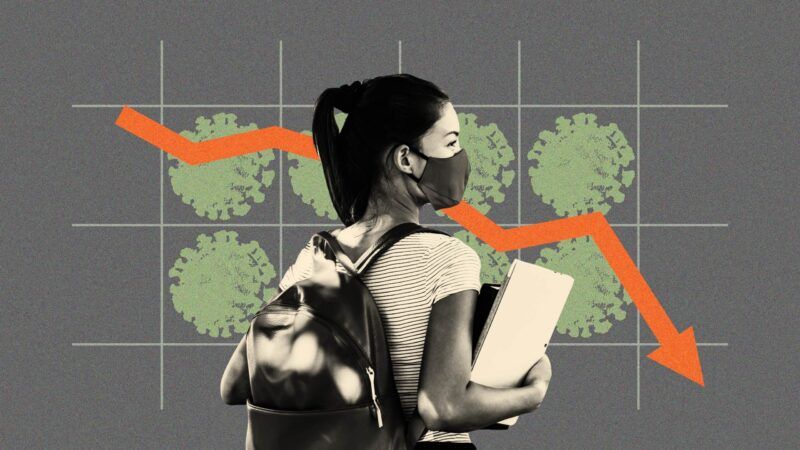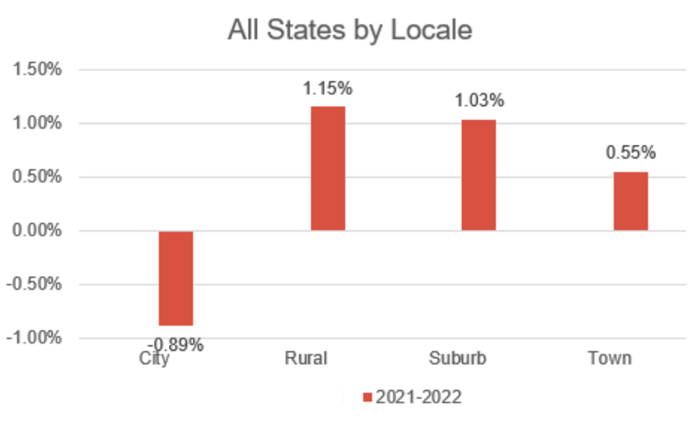COVID-19 Policies Wrecked Public School Enrollment and Student Outcomes
The kids never came back to big-city public schools, and now districts face budgetary "Armageddon."

After the historic one-year enrollment drop of 2.5 percent in the 2020-21 school year, public K-12 attendance has stubbornly refused to bounce back. Two new studies further indicate that the biggest two-year declines correlate strongly with the most restrictionist school-opening policies, particularly in Democratic-controlled big cities.
The American Enterprise Institute (AEI) released a report Wednesday showing that nationwide enrollment in government-run public schools in the 46 states under review declined an additional 0.2 percent in 2021-22, but with a measurable split at the extreme ends of pandemic-related school policies. The most remote school districts lost an additional 1.2 percent enrollment on average in 2021-22, contributing to a two-year decline of 4.4 percent; while the most open districts rebounded by 0.9 percent this year and have lost just 1.1 percent overall since COVID-19 hit.
The divergence in pandemic school policies has never correlated with comparative rates of campus spread, but rather with the comparative concentration of Democratic voters and locally powerful teachers unions. These factors, along with high costs of living and historically low rates of immigration, have combined to make the past two years an enrollment wipeout in the biggest cities.
New York City, the largest district in the nation, has lost a staggering 9.5 percent of students since the onset of COVID-19. Los Angeles Unified, the second largest, where unions have had particular success in getting most every restriction and compensation they wanted, saw the student body shrink by 8.1 percent. School Superintendent Alberto Carvalho, in an article earlier this month at The 74 Million, described the confluence of the enrollment drop and the drying out of the nearly $200 billion in emergency federal COVID relief funds to K-12 schools as potentially "Armageddon."
Unless the long-term trend of Angelenos fleeing the public school system somehow reverses, Carvalho warned, "It's going to be a hurricane of massive proportions."
The only two of the country's top 10 school districts that haven't lost population since the pandemic hit are both in Florida (Orange and Hillsborough counties), where Gov. Ron DeSantis ordered schools open by edict in the fall of 2020. Of the 46 states in AEI's study, only four added students to their public schools: The heavily Republican South Dakota, Utah, North Dakota, and Idaho. The six states that lost between 0 percent and 1 percent during that time, including Florida and Texas, are also GOP strongholds.
"How schools operated affected family decisions," AEI Education Policy Studies Deputy Director Nat Malkus told the Washington Post.
The school tracking service Burbio earlier this month released a study of 2021-22 enrollment trends in 40 states, breaking out data among the four main geographic designations used by the National Center for Education Statistics: Rural, Town, Suburban, and City. Notably, only the "city" category saw a decline this year:

"The effects of the sharp, recent enrollment declines may be long-lived," Stanford University Education Professor Thomas Dee told The 74 Million. "The fiscal consequences will remain for some while."
K-12 spending amounts to around 20 percent of all state and local government spending. If the customer base for this freely offered product continues to reject it in favor of more expensive options, not only will education budgets (which are usually tied to enrollment numbers) get slashed, the political enthusiasm for paying the price tag via taxation will likely wither.
America was a global outlier in the amount of closures and restrictions imposed on public schools. The Centers for Disease Control and Prevention (CDC) in particular played a key institutional role in mixing messages and producing senseless over-caution. Remote learning didn't just repel students, it consigned the ones who remained to staggering amounts of learning loss. We do not yet understand the full extent of the hit, but what public education decision makers did to public schools the past two years will likely go down as one of the most flagrant and impactful acts of institutional self-harm in the 21st century.


Show Comments (44)